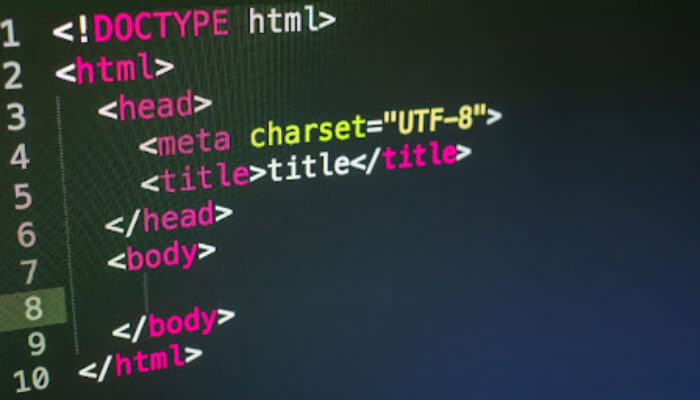Meta tags: what are they and what are Google's latest recommendations for optimising them?
Among the actions that are carried out to boost the SEO of a page is the optimisation of tags and meta tags, small tags that are hidden in the header and that have a very important impact on the positioning of a webpage.
If you want to climb positions in the search engine results pages, but have perhaps overlooked the importance of these tags, this is the perfect article for you.
What are meta tags?
Meta tags are tags that are part of the HTML code of webpages or blogs. Their function is to provide information about the content of the site, in the form of meta data, to search engines, and to request specific actions from search engines, such as whether or not to index something on the website.
Meta tags are added in the header of the page between the <head> and </head> tags. As HTML tags, they can only be seen in the source code of the web page. However, the content may appear on search engine results pages in the snippet.

The form of a meta tag is always the same: <meta name="" content=""/>. In this case, where it says "name" the name of the tag is displayed and where it says "content" the content of the tag is written.
For example:
<meta name="description" content=" Find out what meta tags are, what they are for and why they are important in your SEO strategy." />
A good definition of meta tags helps search engines to crawl, index and rank a webpage. Therefore, these elements are key in SEO strategies, as they contribute directly to the positioning of the page and, consequently, to its traffic.
Types of meta tags
Among the HTML tags that are considered meta tags, we can classify the following as the most important:
-
Meta description: this is a description of the page or a summary of its content so that the user, before clicking, can know what he/she is going to find. Therefore, this tag must be attractive and precise.
-
Meta keyword: this is used to indicate to the search engine the words or phrases with which you want a page to be found. It is no longer used by Google, however, it is taken into account in other search engines such as Yandex or Baidu.
-
Author and copyright: if you want the search engine to know who the author and owner of the content is, you can use tags for this purpose.
-
Meta robots: tells search engines which pages of your site should be indexed and/or crawled and which should not.
Title tag
The title tag is a tag that includes the title of the webpage, but it is not a meta tag as such. It is important to clarify this because it is often confused and included in this category. This can happen because <title> tags are also included within the <head>.
It is important for the title to be short (between 55 and 65 characters) and to describe the content of the page as it will be the first thing the user sees on the results page. It also appears at the top of the browser tab.
To favour SEO, it is also recommended to add the keyword in the Title and, if possible, to put it at the beginning of everything.

How to optimise meta tags
Whenever a page is published on the website, Google automatically generates the tags and meta tags through the content of the page itself. Therefore, we must optimise and rewrite them to get the best results.
Here are some SEO copywriting tips for meta tags:
-
Respect the character limit: for the meta description we recommend 155 characters. It is important not to overdo it so that the text is not cut off. Once the page is indexed, you can see what it looks like in the search results.
-
Use keywords: be sure to include the main keyword of the page in the meta description. The more at the beginning, the better.
-
Differentiate the meta tags: you know Google doesn't like duplicate content, so keep your meta tags original.
-
Write with intention: remember that one of the purposes of meta tags is that the user and search engines know what the content of the page is, so stick to reality.
-
Make sure that all pages have well-defined tags: it is important that all pages are well tagged so that search engines can index them correctly.
-
Remember mobile devices: Mobile first index and SEO positioning have been going hand in hand for a few years now. Adapt your tag strategy to the requirements for mobile display of your pages.
Latest Google updates on meta tags
Google, the main search engine in the world, very often surprises us with changes that affect the SEO of pages, especially during holiday periods. If you're into SEO, you'll know what this is about... These are known as Google Core Updates.
In August, Google announced changes to the way page titles are generated. It is important to remember that titles are not meta tags, but tags. However, we will have a look at the new updates.
Google has created an automatic system that aims to create more understandable and accessible titles and meta descriptions. The new system not only uses the text of the title and meta tags, but also parts of the pages. For example, the main title visible on the pages (H1) is taken into account.
The page administrator will be able to add the name of the site if he/she thinks it can help the user or, if the title is too long, he/she will be able to shorten it to make the information more useful.
Google's algorithm will assess whether this information is of value to the user and if not, it may change both the title and meta description to more relevant information in the search results.
Google's advice for creating meta tags remains the same: "Focus on creating quality HTML title tags. Of all the places we look to generate titles, HTML title tags are still by far the ones we use the most (more than 80% of the time).
Subscribe to our newsletter and stay up to date with the latest digital trends.
Subscribe to our newsletter and stay up to date with the latest digital trends.
No thanks. My inbox is fine as it is.